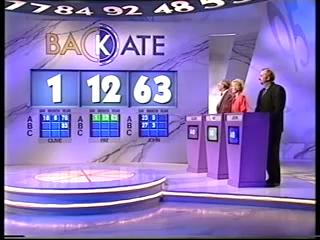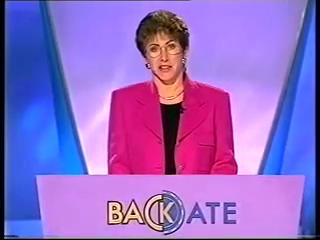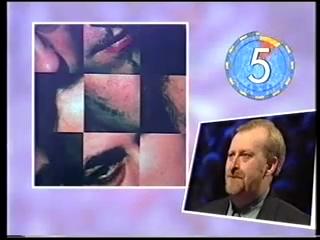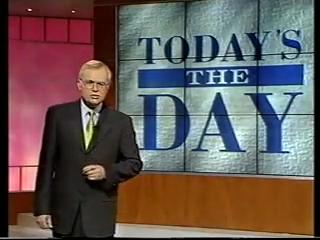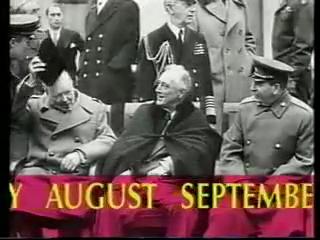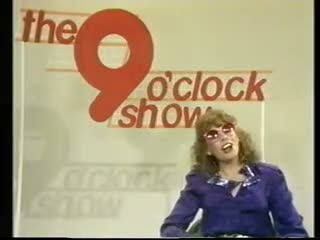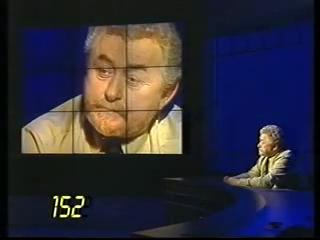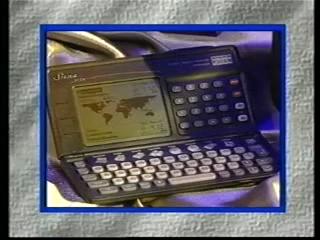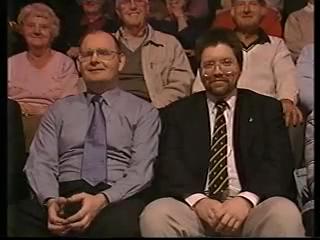Weaver's Week 2012-06-10
Last week | Weaver's Week Index | Next week
If we thought about it, this week's Week would make our head hurt. We're going to tap into the nostalgia theme, by reviewing (and re-viewing) two shows that tapped into the nostalgia theme. Coming up is the acknowledged master of the genre, but first the pale imitation and spoiler.
Contents |
Backdate
Action Time for Channel 4, 1996
The sample episode we've got is undated, but two pieces of evidence make us fairly certain that it comes from the new year series. It begins with the traditional Channel 4 blocks logo. This puts it no later than October, as the 4circles presentation era had begun in time for the first episode of Wanted. Additionally, we half-recall a small but crucial change to the rules for the second recording block, which we'll discuss in due course.
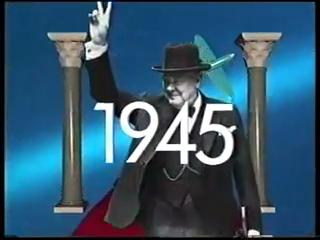 Winston Churchill making the International Sign of The Voice.
Winston Churchill making the International Sign of The Voice.
Backdate went out at 4pm, airing immediately before that year's first series of Countdown. For a gentle programme aimed at viewers with a cup of solid tea and milky biscuit, it certainly began with a raucous guitar and synth tune, and a trip through the tunnel of time, from Winston Churchill to a snotty bratty punk. Host of the programme is Valerie Singleton, from "The Money Programme", "PM Reports", "Val Meets the VIPs", and other shows.
Val introduces the contestants, three of them. Each gives their date of birth, and names someone who shares that date. So a contestant might report, "I was born on 5 June 1947, the same date as the Marshall Plan was inaugrated." Once everyone's done this, Val asks a question, and the players compete to buzz in, marked by a nice little twinkling sound. Ten points are awarded for a correct answer, and the player gets control of the number blinking on the board.
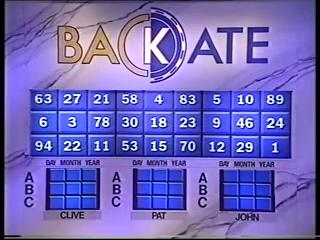 No, that's not Numberwang.
No, that's not Numberwang.
Ah, the board. The big, blinking, blighter, the Backdate board. Twenty-seven assorted numbers, with some three-by-three grids beneath them, one for each player. Val doesn't deign to explain the rules, but it appears than answering a question correctly entitles the player to pick one of the numbers from the board, and move it to one of the squares on their grid. The columns are headed "Day", "Month", and "Year", and the rows have the somewhat more prosaic names "A", "B", and "C".
Clearly, "Day" will take any number up to 31, "Month" will allow any number up to 12, and "Year" is for those numbers above 31. Here lies the change we vaguely remember from late in the year: the board was clearly split into days, months, and years. Even in this early incarnation, it's possible for all of the numbers to go into the bottom grids and for them to form nine valid dates.
Play continues, with Val asking questions, players signalling in, and numbers moving from the top to the bottom of the board. Eventually, one of the players will complete a row, containing a valid day, month, and year. This is a Dateline, and interrupts the flow of questions.
Before the series began, the producers went through the history books, and wrote a question about every single day in history. All of these questions have been filed away on computer, so that when the appropriate Dateline is completed, the right question and answer will appear on Val's monitor. Should the contender give the right answer, they'll get a bonus of 30 points. They'll also find the Dateline has been frozen, meaning they can't change it until they've answered another Dateline question correctly. Unfrozen datelines can be changed at the player's whim, by replacing a number with another. Not that Val explains this point when it happens, we're expected to guess it by osmosis.
Anyway, after nine questions, the opening round has finished. We're then into the entertainment round – there's a question for each player stemming from a music cue, a question from a film or television clip, and one based on a quotation. And there's a discussion of the player's taste in music and movies. For correct answers here, the player is able to pick a number of their choice from the main board.
Whether right or wrong, this round has really dragged – the clips and chat and Dateline questions mean it's something like nine minutes from beginning to end. The internal advertising break almost comes as a relief.
After the break, there are more questions on the buzzer. Again, the reward for a correct answer is ten points, and a number. This time, the player has the option to pick a number from the main board, or to pinch one from their opposition. The pace has clearly picked up, and – with Dateline bonuses available to all – the outcome is never quite assured until the final hooter. There are options for tactical play in the main game – a canny player will build up two working Datelines in the early stages, so that they can swap around an element, and be assured of a Dateline question every time.
Whoever has the highest score at the end of this round goes on to play the prize round, A Date With a Decade. Here, they're allowed to select a decade, and will see nine years from that decade. Val will give them events that took place during one of the years, and the contender is to shout out the year when the event took place. A correct answer means the year disappears, replaced by a piece of someone's face. The face is scrambled, with the elements appearing out of order. Only if the contender can put all nine events to their year, and identify the jig-sawn face, will they retire with the day's star prize – a leather-bound edition of the Chronicle of the 20th Century. We don't recall the prize for those who failed the final challenge, but we do know that daily losers were given an electronic organiser.
Now, Backdate has one fairly large problem. It claims to be a nostalgia quiz, but it's not really a nostalgia quiz. Of the 40 or so questions in the main game, only about a third could reasonably be described as "nostalgia", and that includes the questions about the television clips. The nostalgia questions that do get asked tend to be insufferably banal. "Which television magician, famed for walking through the Great Wall of China, got stuck in a lift in Vienna on 23 September 1994?" [2] And some of the research is dubious at best: "In the seventies, Nicholas Parsons hosted which radio panel game?" [3] That's for values of "the seventies" extending to "Mondays. Right now. While this series is on air."
The basic idea behind Backdate was sound. The prize round for the daily winner was fast and frantic and properly built up the tension, and Valerie was always able to keep up with the fastest contestant. But the pacing in the early rounds was desperately slow, and the most important format points – that contestant's can't change a frozen Dateline, or repeat a Dateline in the same programme – were never explicitly mentioned.
Backdate came from Action Time, probably the biggest name in glitzy game shows during the 1990s. It wasn't a bad show, but it was never going to last long or stick in the memory. Unusually, Channel 4 had commissioned something to compete with a programme on another channel, and – as Fox Television will attest – the copycat always comes off worst.
Today's the Day
Mentorn Midlands for BBC North, 1992-9
No problems at all in identifying the transmission date for our sample episode: 17 June 1997. The year is in the end credits, the date is all over the show.
Today's the Day had originally been hosted by the political journalist Andrew Rawnsley, as a quiz between celebrity panellists. It was heavily reformatted, and began on daytime television on 1 November 1993. It would continue to go out until 1999, ending only when Martyn Lewis left the BBC. The sample episode we've found is of a series semi-final, so is very slightly different from the normal proceedings.
Not at all different is the way the show begins – with a bold-as-brass upbeat tune, ending with a one-note stab that sounds a bit like the beginning of a news bulletin. The theme is urgent and optimistic, and the titles look like fun – there's Frank Bruno with his medal, someone wind-surfing, and – oh – Cliff Richard singing at the Wimbledon Rainwear Exhibition. Can't have 'em all.
Martyn gives us some brief previews of clips coming up during the show – this is clearly something done to ensure the show runs precisely to time. There's a very brief introduction to the teams – two pairs of contenders – before we go straight into round 1. Stop the Clip begins with Martyn asking a question. "Who is this clip about?" Then it's straight into a news clip, which the contenders can interrupt by buzzing in. A correct answer wins them some points, counting down from 15 to 0 during the run of the clip. Get it wrong, and it's straight back into the clip. All the other rounds offer points in multiples of 5, so this is effectively the tie-break.
After three clips, we're into round two, the archive television round. Three clips for each team, and no points for working out what programmes they're taken from. Instead, the points are for questions with some relationship to the clips – two questions for each clip, five points, and they won't be thrown across. Some of them are about what we've seen. Others are more general: a clip about a nautical play invokes a question about another, completely different, boat drama.
Round 3 is upon us, Famous Faces is clips from this date in previous years. Pick one of four years, see a clip, and answer a question about it. Again, five points per question, but these can be passed across. The quick-fire buzzer round is next, about three minutes of questions, asked at a brisk pace. The questions are carefully paired up: there's a question about Barry Manilow (whose birthday is 17 June) is followed by one asking after a cover of Manilow's works. There are a few swerve questions in there, it's not entirely clear where they're going from the opening phrase. Five points for a correct answer, errors will get passed across.
Normally, at this point, the team with the lower score would be eliminated, and the winners would go on to meet the champions from the previous day. As this is a semi-final, there's no half-way cut, the two teams play through. We do still pause for the Legalised Telephone Lottery segment: an announcer lady asks a patronisingly obvious question: over what period of time is the endurance race Le Mans run? Is it 24, 48, or 72 hours? [5]. Call the 0898 number: today's winner will either get a colour television or an electronic personal organiser; five runners-up get a copy of the Today's the Day book, and all six will be able to win a pair of round-the-world tickets at the end of the series.
On to the Video Wall round: eight clips, all of them hiding questions. Two worth five points, two worth fifteen, the other four worth ten points. In theory, the 15-point questions are harder than the 5-pointers, but they're trivia questions. Easy if you know the answer, fiendish otherwise. Teams take it in turns to pick their clips, so should both end up with 40 points; questions can be passed over at the original value.
This Video Wall round goes on for about seven minutes, perhaps a bit too leisurely a pace after the frantic buzzer round. But there's more quick-fire work to come, with the concluding In the Spotlight round. The leaders, and then their opponents, will have one member answer questions for 60 seconds. There's no conferring, 10 points per correct answer, and nothing thrown over. In regular play, the champions' team has to alternate – if Bob answered on Monday, then Alice takes the questions on Tuesday. Here, we're in the semi-finals, but there's no choice of player – we guess that both teams are rotating from their quarter-final win.
In the end, Arfor and Alan Jones are the winners, and they'll face Trevor Montague and Andy Curtis in the final. Who will win? [6] Martyn appeals for further contestants – call the 0990 number on screen, or consult Ceefax page 575 – and throws forward to the grand final at 5.30 tomorrow.
Now, what did this show get right, and Backdate get so wrong? First of all, Today's the Day was a nostalgia quiz. The recent past permeated the fabric of the programme – it was built around clips from the BBC's extensive library, with perhaps a few licensed from ITV. Including the footage in the call-and-lose contest, we'll have 22 snatches of vintage television, and the majority of the questions did have a link – however tenuous – to the day in question. Today's the Day started with a simple idea – this day in history – and let a quiz grow around it. It feels that Backdate started life as a standard quiz, with the date in history element bolted on in a most ungainly fashion.
Today's the Day always had problems with its pacing – the first round was fast, the last round was properly tense, and the buzzer round in the middle got the juices flowing, only for the 0898 segment and video wall to calm them down again. It was also a bit too easy for the programme to produce a tie, and we never like tie-breaks.
But none of these criticisms stopped the programme from being entertaining and fun. Indeed, our first thought on re-viewing the sample episode was, "Why don't they recommission this? Like, now?" Even after thinking about it a bit more, we're still left with the same thought: more, please.
Countdown Update
We've not done an update on Countdown since mid-April, and Finals Week begins in a week and a half. There have been a lot of champions, suggesting play hasn't been of an exalted level. Monica Sutcliffe (1 win), Megan Jephson (2 wins), and Kerry-Anne Alcock (1 win) all left Manchester with teapots. Nick Hall booked a return ticket for Finals Week: he had six wins, and was unlucky to lose to Catherine Johnson (1 win).
George Anderson and Craig Lingard both scored three wins without ever looking comfortable: George Hills was a bit lucky in his one win. Stuart Wright notched up three wins, including the first century score in six weeks, but lost to Tony Ackland. Glenn Clements won twice before Suzi Purcell became the series' third octochamp – she played five very good games and three that were good enough to win. Ben Nicholson has four wins so far, twice with scores of 59.
With eight more games before the finals, the present qualifiers are:
| 1 | Jack Worsley | 8 wins | 818 pts |
| 2 | Peter Lee | 8 | 801 |
| 3 | Suzi Purcell | 8 | 686 |
| 4 | Nick Hall | 6 | 588 |
| 5 | Victoria James | 6 | 567 |
| 6 | Mark Murphy | 5 | 454 |
| 7 | Rob Gibney | 4 | 486 |
| 8 | Ben Nicholson | 4 | so far |
The top two seeds look like they'll make the final, but we reckon the two most dangerous floater is Rob Gibney in the bottom of the seedings. We'll find out from 21 June, with coverage in the Week of 1 July.
This Week And Next
The final of The Voice of Holland UK took place, and the winner turned out to be Leanne Mitchell. Though the BBC did stay with proceedings long enough to hear this, they finished the programme before the winner's reprise even began.
Over on The Chance to Go Into Business With Alan Sugar, the former Minister for Going "pfft" on Have I Got News For You has decided who he's going into business with. It's Ricky Martin, who does seem to have changed since his days as a teenage heartthrob.
Ratings from BARB for the week to 27 May demonstrate the British still love the Eurovision Song Contest. An average of 7.6 million people saw the final, putting it ahead of The Apprentice (7.25m) and miles ahead of The Voice (5.25m). The latter show almost got overtaken by the venerable HIGNFY (4.9m), another show featuring will.i.am on his mobile. No game shows made ITV's top 30. The Apprentice You're Fired led on BBC2 (2.65m), and Come Dine With Me's jubilee special dragged just 1.25m people away from the British summer.
A League of Their Own Sky1 on The Satellite Channel remained top of the minor channels listing, with 855,000 viewers. The Eurovision Song Contest semi-final on Tuesday was seen by 750,000 people; Thursday's had fewer. The Chase on ITV+1 (245,000) beat All New Blockbusters (235,000), and both came close to topping Come Dine with More4 (350,000).
Answers to questions in the main text. [1] Bob Geldof. [2] David Copperfield. [3] Just a Minute [4] Janet Street Porter [5] 24 hours.
As usual in June, Channel 4 is the only channel worth watching – A Short History of Everything Else (10pm Wednesday) and The Million Pound Drapp Live (8.30 Friday, 9pm Saturday). On the last one, we're snickering at Channel 4's Head of Interactive Gubbins, who claims that "everyone watches television with a tablet nearby". Yeah, we saw Grayson Perry's show this week, we needed a tablet. BBC2 invites us to Mock the Week (10pm Thursday). Saturday's highlight is Pointless Celebrities (BBC1, 6pm) with Konnie Huq and Angela Rippon.
To have Weaver's Week emailed to you on publication day, receive our exclusive TV roundup of the game shows in the week ahead, and chat to other ukgameshows.com readers, sign up to our Yahoo! Group.


